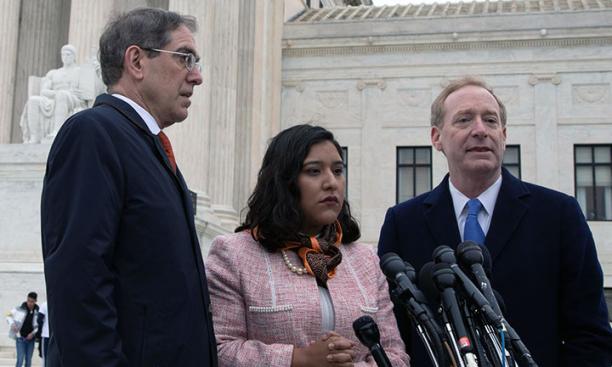
The University’s legal case to support protections for young undocumented immigrants was argued before the U.S. Supreme Court Tuesday, where justices in the court’s conservative majority remained skeptical.
But Princeton president Christopher Eisgruber ’83 remained confident after the hearing on the case.
“The arguments that we heard in the courtroom today were about the importance of the government speaking plainly and honestly in a straightforward way, so that people can hold it accountable for the decisions that it makes, particularly when it affects thousands of people,” Eisgruber said.
Princeton joined Microsoft and María Perales Sánchez ’18 in November 2017 in suing the Trump administration, contesting its decision to end the Deferred Action for Childhood Arrivals (DACA) program. The Obama administration created the program in 2012. Participants, including Perales Sánchez, are shielded from deportation and can qualify for other privileges, such as work authorization and driver’s licenses.
Speaking after the hearing, Eisgruber said the case involves “the human consequences of this program and what it means for María and other DACA beneficiaries, and they are about the basic principles that this country has stood for over time — principles that encourage honest, hard-working people to make their homes here and that have made this country a beacon for freedom throughout its history.”
Trump administration officials tried to pull the plug on the program in 2017. They argued that the program was illegal, a point fiercely disputed by immigrant advocates. A flurry of lawsuits, including Princeton’s, followed. Lower courts have allowed DACA to continue for existing participants while the cases are litigated.
One of the main points that DACA’s defenders have tried to make is that Trump administration officials did not consider the impact of their decision or explain it. The advocates argue that federal law requires the administration to make a serious effort to do both when making a decision with such far-reaching consequences.
Microsoft President Brad Smith ’81, who also attended Tuesday’s hearing, said the oral arguments showed that the case wasn’t just about a “narrow technicality.”
“When so many people come forward and rely on this type of program and then the government cancels it, they are owed an explanation as to why,” Smith said. “That’s part of the fundamental fairness that we all expect in this country.”
That explanation is crucial, not just to the 700,000 DACA participants, but to “millions of businesses” that depend on the program as well, he added.
Eisgruber said it was an “easy decision” to join Perales Sánchez’s lawsuit two years ago. Perales Sánchez said the support of Princeton and Microsoft “shows how much we are part of this community, how important we are, and how much we are valued.”
Both also stressed the need for further action outside of the courthouse. “The day will come when we need to cross the street to Congress, and the day will come when we need Congress to act,” Eisgruber said. “What we want more than anything else is this program that was created on a temporary basis to be made permanent with a pathway to a future where these people can become American citizens.”
The court is expected to issue a decision by the end of June.
